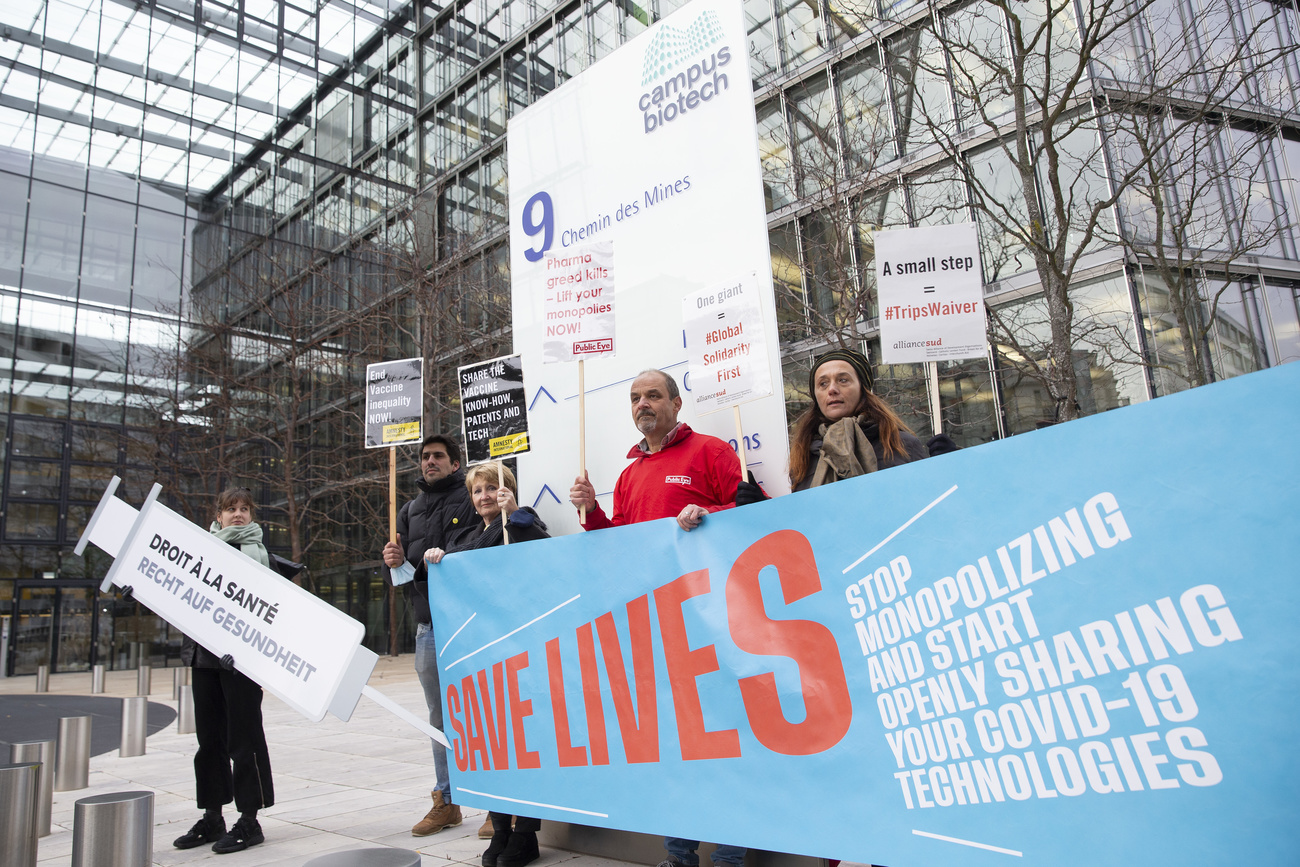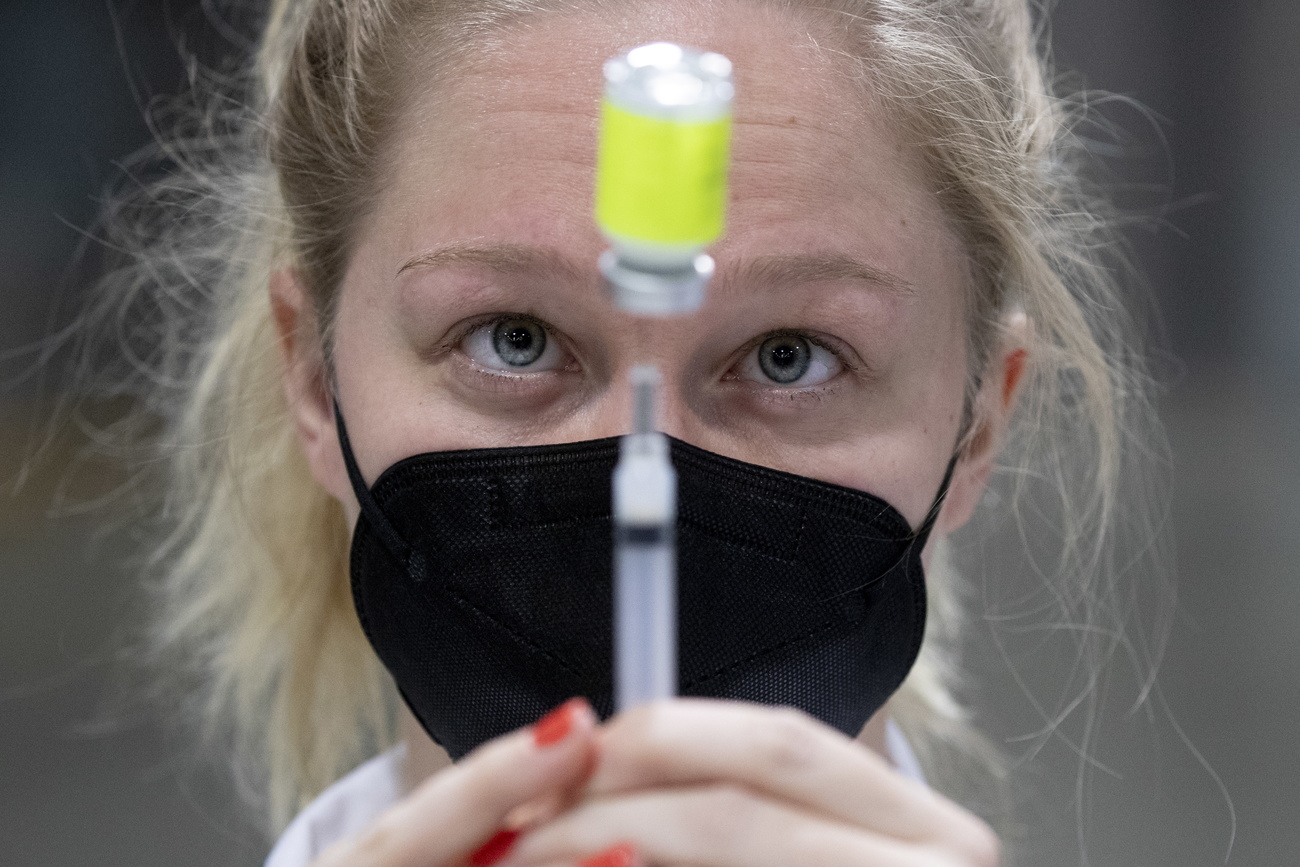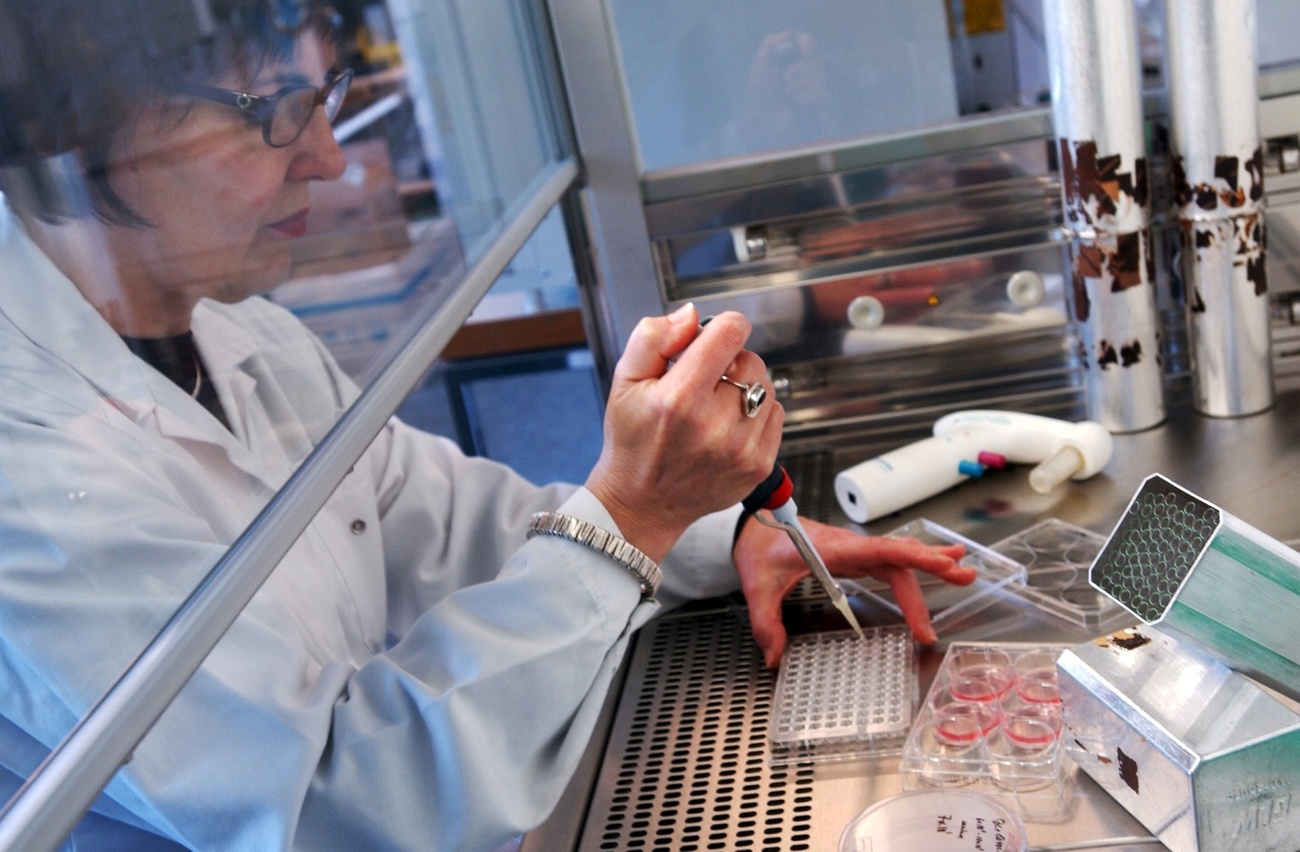How Switzerland works against fair access to science

The Covid-19 pandemic has re-opened the debate on science as a human right. Billions of people in the world still don’t have access to vaccines and other life-saving treatments. Meanwhile, rich countries like Switzerland are doing everything they can to maintain their privileged access to scientific discoveries.
In 1948, equal participation in “scientific advancement and its benefits” was enshrinedExternal link among the social and cultural rights of the Universal Declaration on Human Rights in Article 27. The aim was to avoid repeating errors committed in the Second World War. During that dark period of modern history, science was instrumentalised for political, economic and military purposes, causing death and destruction.
The Universal Declaration marked the birth of the human right to science, which was to be guaranteed by all states, just like the right to freedom of expression and due process.
The right to science, however, is far from being universally recognised. Millions of people around the world do not have access to effective and safe vaccines and drugs, as the coronavirus pandemic has shown – and this despite the fact that vaccines have been brought to market in record time thanks to state investment and sharing of scientific knowledge.
The World Health Organization (WHO) and the public-private alliance Gavi declared the anti-Covid-19 vaccines a global public good. Yet they have not succeeded in distributing the vaccines equally throughout the world using the Covax programme, which was devised for this very purpose. As a result, only 15% of people who live in poor countries have been vaccinated against Covid-19 with at least one dose, compared to 72% in wealthy countries.
This disparity of access to scientific progress is not only unjust, but poses a serious problem to public health.
“Science as a human right is a public good, both individual and collective, and should therefore benefit everyone,” says Andrea Boggio, a professor of legal studies at Bryant University in the United States.
But it is here that the greatest obstacle lies. After more than two years of the pandemic, it has become clear that wealthy countries like Switzerland have no intention of giving up their privileged access to medical technologies that could save millions of lives and ensure public health on a global level.

More
Covid vaccines: how to end the wait for billions of people
Intellectual property threatening public health
Switzerland has played an important role in promoting equal access to Covid-19 vaccines. It’s not just because WHO and Gavi are based in Geneva. In May 2020, the Basel pharmaceutical giant Lonza signed a ten-year contract with Moderna to manufacture and distribute its mRNA vaccine outside the US.
However, even in this country the vaccine campaign has not been a complete success. The population at large has been slow to respond, in part because of scepticism about the vaccines and a certain mistrust of measures promoted by the government. As its stands, Switzerland has the lowest rate of people vaccinated against Covid-19 in Western Europe.
Switzerland has also not managed to coordinate efforts to donate unused vaccine doses to countries in need. The federal government announced in late October that it will discard 14 million expired vaccinesExternal link by February 2023. Boggio calls this situation “shameful”.
One of the knottiest problems in making science a universal right involves patents on scientific discoveries. Patenting prevents poorer countries from independently producing the vaccines and other medications they need, and at lower prices.
“The way we have managed intellectual property issues during the Covid-19 pandemic is completely wrong,” says Gabriela Ramos, assistant director-general for social and human sciences at UNESCO. Intellectual property rights have allowed companies like Pfizer/BioNTech and Moderna to exercise control over all production and distribution of vaccines against the coronavirus.
The pharma companies have done this despite receiving huge public investmentsExternal link to develop these technologies – over $430 million (CHF404 million) from Germany and $110 million from the European Union for BioNTech, and about $2.5 billion from the US for Moderna.
“The investments made with taxpayers’ money have been privatised and are worth billions of dollars in profits to these companies,” says Ramos. “They then block equal distribution of vaccines in the name of intellectual property rights. It’s unjust.”
Pfizer/BioNTech and Moderna have argued in their defence that developing the vaccines was also made possible by private investors who assumed a risk. Waiving the patents would endanger this kind of investment in the future, they say. Both companies had profits in the billions in 2021 – $19.5 billion for BioNTech (up from $495 million in 2020), and $18.5 billion for Moderna (compared to $803 million in 2020).
In October 2020, India and South Africa, supported by about 100 poorer countries that are members of the World Trade Organization (WTO), called for a temporary waiver of patents for Covid-19 vaccines, medications and diagnostic tools for the rest of the pandemic or until there is global herd immunity.
These countries fought to obtain this waiver for a year and a half, but the agreement reached last June at a WTO ministerial conference in Geneva left a bitter aftertaste. Stubborn opposition by the EU, the US, Switzerland and Britain torpedoed the idea of a patent waiver.
No outlet for citizens’ grievances
According to reportsExternal link from non-profit organisations like Oxfam and Emergency, Switzerland played a major role in watering down the resolution. The Swiss delegation hailed the agreementExternal link as “successful”.
“I think this is the worst example of how we should implement the right to science,” Ramos says of the negotiation on patents. The fact that governments are ready to put big pharma profits before people’s health explains why distrust of science is growing, she adds.
Although Switzerland hosts important institutions like the United Nations and international events like the Geneva Science and Diplomacy Anticipation (GESDA) summit on emerging science and tech, the country is not exactly a model when it comes to the right to science – and not only because it vigorously defends intellectual property. It is also difficult for Swiss citizens to claim this right through international institutions.
“The protection of social and cultural rights in Switzerland is notoriously inadequate,” says Samantha Besson, professor of International Law at the University of Fribourg. The Alpine country has never ratified the optional protocolExternal link to the International Covenant on Economic, Social and Cultural Rights – which would allow citizens to report to the committee overseeing implementation of this text any violations of their rights under the covenant – despite being repeatedly called upon to do so by UN human rights bodies.
Besson finds that pressure from politicians and the “research business” that uses research to obtain a profitable advantage is too strong for Switzerland to give legal weight to the right to science anytime soon.
To be sure, Swiss civil society can resort to direct democracy mechanisms, such as referendums, to make its voice heard. But Besson thinks this alone is not enough to guarantee recognition of Article 27 of the Universal Declaration on Human Rights.
Edited by Sabrina Weiss
Translated from Italian by Terence MacNamee

More
Coronavirus: the situation in Switzerland

In compliance with the JTI standards
More: SWI swissinfo.ch certified by the Journalism Trust Initiative












You can find an overview of ongoing debates with our journalists here . Please join us!
If you want to start a conversation about a topic raised in this article or want to report factual errors, email us at english@swissinfo.ch.